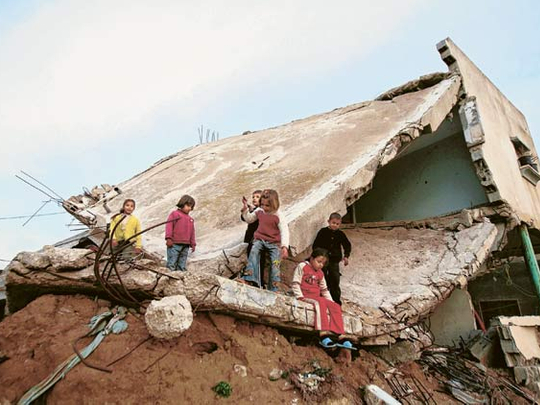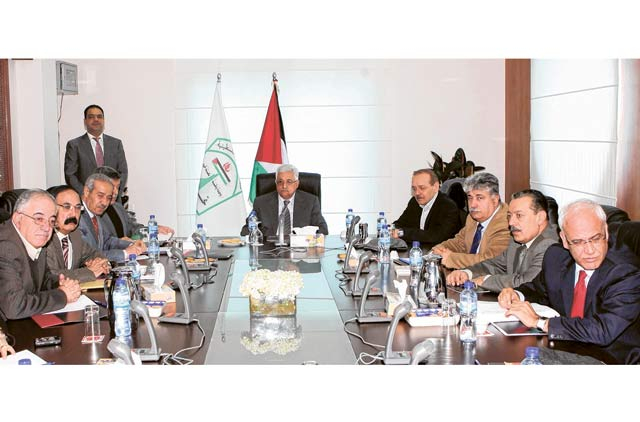
Dubai: Former Palestinian negotiation support staff have confirmed the veracity of the leaked Palestinian National Authority (PNA) documents and have spoken about a deep divide and widespread frustration over positions adopted by negotiators.
A former senior staffer at the Palestine Liberation Organisation's (PLO) Negotiations Support Unit (NSU) who had access to Palestinian negotiators, confirmed the authenticity of the leaked "Palestine Papers" to Gulf News "for certain".
The documents were released this week by Al Jazeera, which is based in Qatar, and the UK's The Guardian, and have caused controversy in Palestine and the wider Arab world for revealing the lengths to which PNA leaders were willing to go in private in order to reach a compromise peace agreement with Israel.
The sources spoke to Gulf News on condition of anonymity, shedding light on the inner workings of the unit at the centre of the leaks, where the documents are believed to have been stolen from.
Gulf News has learned that since the leaks were released, staff members at the NSU have had their laptops confiscated, access rights to files restricted and have had their activities monitored.
"There was no security on any of the documents. They were housed in one office in Ramallah and every employee of the NSU had access to them," the former senior staffer said. While non-NSU officials had access to some of the documents, only NSU staffers had full access to all the documents, the source added.
Tough dealings
The source said that one of the likely causes of the leak was disgruntlement, which appears to have been widespread at the unit.
"There was not a single person in that office who was not upset in some way, shape or form, with the PNA," said the source.
Not all staff members agree, however. While some left the unit in protest of the way it was managed and because of the compromises the PNA was willing to make, others stayed and have defended the way the negotiations with Israel were conducted.
Speaking to Gulf News, former NSU staff members who defended the position of the PNA either cast doubt on the authenticity of the documents or called for a closer look at the context in which the compromises were offered, saying that dealings with Israel were "very tough".
It is that position that led to much of the disgruntlement within the unit which in turn led to resignations, the former senior staffer said.
"It was the same strategy: [the PNA negotiators were] always trying to make themselves look good, like ‘the [peace] partner'," the source said.
"They were sensitive to Israeli claims like the [claim about there being] no partner [for peace], so they would bend over backwards to prove themselves to be the partner. Their strategy has always been: let's just get the Israelis to like us, and if they like us they will give us more.
"I saw where this was going. I saw that they were going to make a compromise deal. They were going to split and run and I didn't want to be a part of it. I believed the only way we were going to get a better deal was if we took a harder line and articulated a much stronger position," the source said.
The source admitted to having been privy to some of the compromises that the Palestinian negotiators were willing to make, but said the leaks showed that the negotiators had been willing to go even further than was previously known.
The NSU is considered to be an elite group of lawyers, experts and advisors for top Palestinian negotiators.
Its staff is predominantly comprised of Westerners, most of whom are of Palestinian and Arab descent.
Another former NSU staff member said they are "well-paid Ivy League graduates who travel a lot, stay in five star hotels and are largely detached from the Palestinian masses".
They carried out the technical and policy-related work for the negotiators including the writing of their op-eds and memos.
They also formulated negotiating positions and attended meetings. The negotiators, however, had the final decision on such matters.
The former staffer said while the unit has no political role, it regularly worked "beyond its mandate" in coordinating with Israel on security matters and in "undermining Hamas".
Staffers at the unit often find themselves at odds with the "old guard" of Palestinian leaders whom they accuse of abandoning the cause of the four million Palestinian refugees.
The "old guard" sees the NSU as a group of "foreigners" with an agenda not in line with the aspirations of the PLO.
The former senior staffer said dissenters within the NSU had no outlet for their grievances in a Palestinian Authority that was increasingly becoming like "a dictatorship".
The source however doubted that the leaks would have a significant affect on the PNA: “We already knew these guys [the PNA] were corrupt buffoons. The leaks aren’t adding anything except verification, in a sensational way, but not more than that”.













